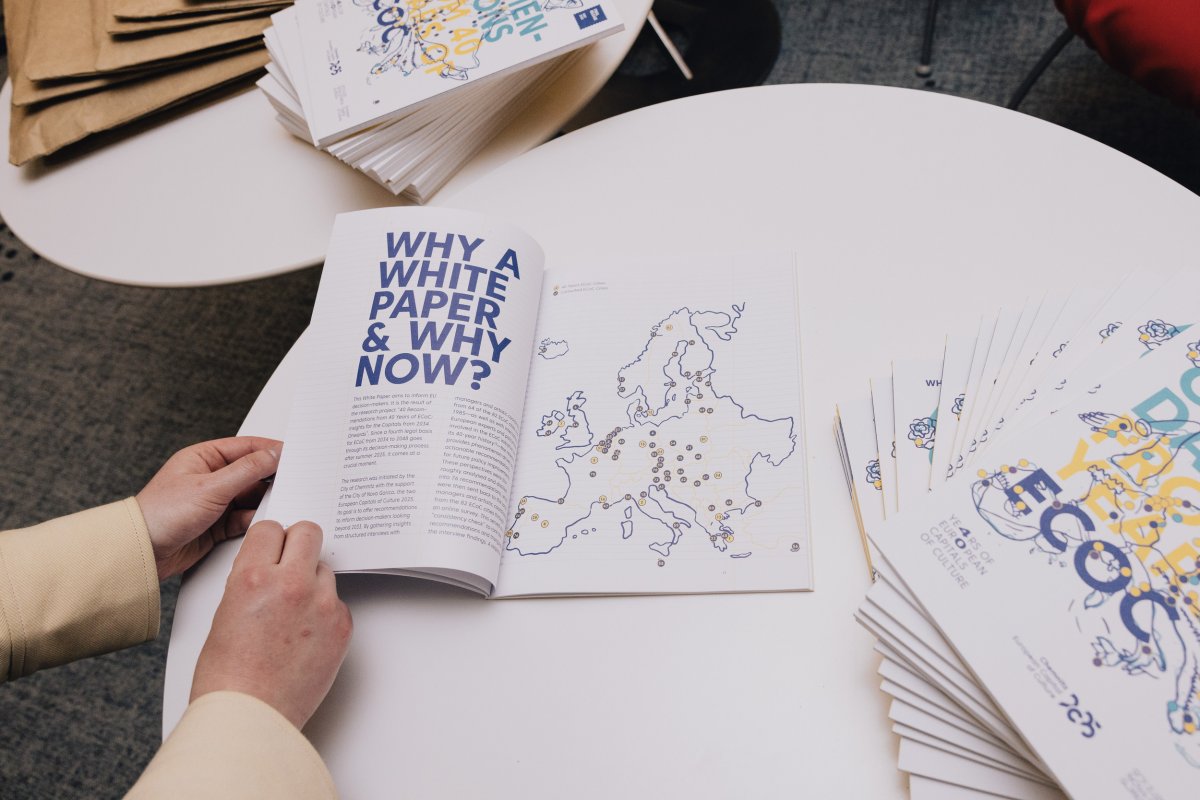By Irini Polidorou
After four decades of transformative cultural programming, European Capitals of Culture (ECoCs) are poised for a significant evolution. A white paper, drawing from the experience of hands-on Managers and Artistic Coordinators of 64 of the 82 ECoCs in 33 different countries and 240 different bidding folders from 1985 until 2028, has outlined five critical strategic proposals for the initiative's future.
"Cities will receive a first €500,000 of the Melina Mercouri Prize right after the title designation to support early hiring and project structuring", instead of the current practice of receiving the total amount of €1.5 million on the March of the ECoC year. This could be the new rule, if recommendation 31 of the 40 recommendations of the White Paper of Chemnitz is adopted in the upcoming revision of the EU texts governing the ECoC.
"For cities with a small budget, it can be important to get this money as soon as possible", said one of the ECoC leaders, interviewed to the shaping of the "White Paper: 40 Recommendations from 40 Years of ECoC: Insights for the Capitals from 2034 onwards". The Paper aims at contributing to a more inclusive and impactful ECoC framework, adaptive to today's challenges.
Key Proposals for Transforming Cultural Capitals
The first proposal, "Europe in Everything you Do", aims to strengthen the European dimension by moving beyond local perspectives and professionalizing the initiative's branding and communication. The second, "Celebrate what you Change", emphasizes long-term cultural development through sustainability criteria and digital innovation. "Make it Simple and Transparent" focuses on streamlining selection processes and introducing an Artists' Code of Practice to ensure fair working conditions. "Keep Your Promises" seeks to transform bidbooks into binding commitments with financial incentives tied to legacy projects, while "Stop Making the Same Mistakes" proposes creating an EU-supported digital platform for knowledge exchange and mentorship. These proposals, set to be discussed by European institutions in autumn 2025, aim to make the ECoC initiative more inclusive, impactful, and responsive to contemporary cultural challenges.
The Paper was presented to Members of the European Parliament in the framework of the dialogue over the revision of the legal basis on ECoC. This dialogue is expected to begin in autumn 2025 with the participation of the European Commission, the European Council, and the European Parliament, aiming at adopting the revised decision by 2027. This is in order to be applicable to the ECoCs from 2034.
The Paper resulted from an independent study implemented as a joint research initiative led by Professor Valentina Montalto and initiated by the City of Chemnitz, with the support of the City of Nova Gorica, the ECoCs for 2025.
463 recommendations were initially collected, which were clustered under 35 recommendations. Five more recommendations were added during the proceedings of the Chemnitz conference in April 2025, with the contribution of more than 200 ECoC professionals, experts, and representatives from the EU institutions.
Since the first ECoC in 1985, at the initiative of Culture Ministers Melina Mercouri (Greece) and Jack Lang (France), the institution of ECoCs has touched the lives of an estimated 52 million people, or at least 1 in 10 Europeans. An approximate 30% of all ECoCs between 1985 - 2029 have a population of less than 200,000 inhabitants and an increasing number of smaller cities view participation in the ECoC as a favourable opportunity, stimulating regional development and reaching every corner of the EU.
The five proposals across all levels of Governance

Bridging practice with policy, the proposals are clustered under five Political Matters, reflecting the all governance levels, while 19 of the 40 recommendations prioritise changes to the European legislation on the ECoC.
According to this bottom-up approach, future candidates to the ECoC should put Europe in everything they do, celebrate what they change, keep their promises, and stop making the same mistakes. The Commission is called to make the competition process simpler and more transparent.
1: “Europe in Everything you Do”
Instead of the current practice of emphasizing on the local aspect, practitioners suggest strengthening the European dimension of the initiative. At the same time, the Commission is called to professionalize the initiative’s branding, including through a specific budget line for enhancing its strategy communication and visibility.
For instance, future ECoC organisers may need to use an adjustable yet common ECoC logo, aiming at strengthening the European dimension.
2: “Celebrate what you Change”
Bidders may also need to have a long-term approach when preparing their bid books, since “The whole focus needs to be more, not on the celebration of a Capital of Culture, but on the whole notion really focusing on long-term development and change”, as said by an ECoC manager.
A “Sustainability” criterion may be added to selection criteria, where ECoC organisers will have to apply green practices according to recognised standards within their cultural programmes.
Candidature folders will also need to include “Digital dimension”, beyond its use as a supportive mechanism. The aim is to spark innovative digital solutions towards the democratization of cultural production, consumption and exchange, as well as in measuring and analysing cultural impact.
3: “Make it Simple and Transparent”
The Commission is called to simplify selection and monitoring processes. For example, on the spot visits are to be replaced with fact-based reviews towards an evidence-based, less time-consuming and more fair evaluation.
Political Matter 3 introduces also the adoption of a Code of Practice for Artists which ECoC cities' bidbooks should align with, in line with the report of European Commission on “The Status and Working Conditions of Artists and Cultural and Creative Professionals”.
ECoC professionals suggest securing fair practice and pay for artists, their early and ongoing involvement in the ECoC procedures and the protection of their rights including intellectual property. They include as well the strategic integration of artists beyond the ECoC year and their balanced representation in governance, recommending a minimum of 51% of members in jury panels to have an artistic or cultural background.
4: "Keep Your Promises"
Future candidates need to make sure they can keep their promises as bindbooks are to be transformed into binding commitments of conditional purpose to the payment of the full Melina Mercouri Prize.
The second endowment of €1 million is to be paid at the beginning of the ECoC year, and will be connected to binding obligations to long-term legacy projects. Cities are to be more accountable towards the use of resources as monitored by the Commission, yet more supported from national governments accordingly bound and despite possible political changes.
5: “Stop Making the Same Mistakes”
“The learning really has been insufficient and insubstantial, which is the reason the cities continue to make the same mistakes, even the ones with the best advisors” as said by an ECoC manager.
Therefore, recommendations suggest cities to be facilitated in exchanging best practices and know-how. In this context, the Paper calls for the creation of an EU supported digital platform-hub, documenting experience and enabling structured mentorship for first-time bidders by experienced ECoC professionals, focusing on governance, stakeholder engagement, financial planning, and long-term cultural impact.
Header Photo credit: @Nasser Hashemi
Photo source in Header - Chemnitz European Capital of Culture here
Find the White Paper here
Photo 2 credit @Bryan Nicola Maxwell









